- Home
- James Phelan
The Hunted Page 2
The Hunted Read online
Page 2
“For the CIA?” Somerville asked.
“No, before that,” Walker said.
“When you were Air Force?” Somerville asked.
Walker nodded.
“I still don’t get how the Air Force has boots-on-the-ground frontline guys,” she said. “Airplanes, airbases, the Pentagon, sure. But humping around in the mountains with SEALs and Delta?”
“Someone has to have the brains in those Special Forces teams,” Walker replied.
McCorkell and Hutchinson rode in the back of the hire car, a Land Rover Discovery. Bill McCorkell was not a field man. Never had been. Just past sixty, he’d spent a lifetime as an intelligence and international-affairs expert, rising to the post of National Security Adviser to presidents from both sides of politics. His current role was driving a specialist UN desk, from which he ran a small team of multinational investigators in the field and reported directly to the Secretary-General. The intelligence outfit was known simply as Room 360, named after its office number in the United Nations building in Vienna, and its members were sequestered from the world’s best intelligence and law-enforcement agencies.
Walker watched the familiar streets slip by. On the flight here, plans had been made. He and Somerville would check out the tavern. McCorkell and Hutchinson would visit SAS headquarters, Hereford, to see if any old-timers had had contact with David Walker, the dead man.
Andrew Hutchinson was lead investigator and, like Somerville, was on loan to the UN from the FBI. Just a few days earlier, in the events leading up to the terrorist attack at the New York Stock Exchange, he’d been badly wounded. Walker glanced back at the guy. He had a lot to be thankful to him for—the lawman had saved Eve’s life, and because of this his face was a mask of green and purple bruising, and his arm was in a sling.
Walker would not forget that.
And he would not forget Eve, who was now in temporary witness protection courtesy of the FBI. In Maine; that’s all Walker knew.
The English town slipped by. The trees were losing the last of their leaves. The sky was one big cloud of gray.
Whatever happened here, there would be tomorrows with Eve. Maybe not like those yesterdays, but at the very least, there would be closure. Answers. Discussions. Decisions made. Progress. For more than a year he’d been thinking about it, about her, never finding the courage to make the first move, allowing her to believe he was dead, always justifying his actions as a form of protecting her while completing his mission.
“This is us,” McCorkell said from the back seat.
Somerville took the exit to the old RAF base, drove up to the guardhouse and stopped. The two men in the back got out.
“Keep in touch,” McCorkell said as he departed, Hutchinson close behind him.
Somerville nodded. Walker remained silent.
She drove back to town, tapping the sat-nav to take them to the tavern on the B-road.
•
The Boar and Thistle was some twenty minutes’ drive west of Hereford.
There were four cars in the gravel car park: two rentals and a couple of locals.
Walker stood by their parked car and looked around. Twelve houses in view, all well-kept stone cottages. Dark stone, white-trimmed windows. Gardens set up with precision and allowed to overgrow just so. The road through was two-lane blacktop; cars, trucks and vans passed at an average rate of one every fifteen seconds or so. It was just after midday. The sky was darkening. A typical Midlands affair, the lot of it.
“You coming?” Somerville asked.
“That’s what she said,” Walker replied, walking toward the FBI agent who stood waiting by the front door. “Trading to thirsty travelers since 1514” was stenciled inside the entrance. Somerville had a hand on her hip, her jacket open, revealing where her side-arm would have been back in the US. Her bobbed blonde hair was tucked behind her ear against the wind. She dressed well, for a Fed.
Somerville said, “What’s what she said?”
“Joke.”
“Oh. I didn’t know you had a sense of humor.”
“I don’t,” Walker said, opening the door.
2
McCorkell looked across the desk at the SAS Squadron Commander, a Brigadier Smith.
“UN?” the Brigadier said, looking at McCorkell’s card. “Are you guys still around?”
“Our pay checks say so,” Hutchinson replied. He and McCorkell were seated across the 1980s-era laminate desk.
“We need your help on finding this guy,” McCorkell said. They would have preferred to meet with the man at the top, a Major-General in charge of the regiment, but he was away. “Never mess with the man in the middle,” was one of McCorkell’s mottos, and it had served him well in cutting through bureaucracy. He suspected that they would not get far here.
“And which guy would that be?” the Brigadier said.
“David Walker,” Hutchinson said, fumbling with his iPad with one hand as he showed the Brigadier the recent picture of David Walker. “We checked records. You were here when he was.”
“Yes, I remember him. Walker. Yank. Intel expert, anti-terror specialist. Academic and policy man from DC.”
“That’s right,” Hutchinson said. “When did you last see him?”
“And where?” McCorkell said.
“Years ago. Here, on base.”
“What can you remember?” Hutchinson asked.
“Well, let’s see. I was a lieutenant then, just over from the paras. He spoke to us during the first Gulf War, the week before we deployed, about what to expect to extract from prisoners—should we take any.”
“Right,” Hutchinson said. “And you’re sure you haven’t seen him since?”
“Yes.” The Brigadier passed back the iPad. “Why the interest?”
“He’s dead and buried back home, full honors and mourning,” McCorkell said. “But he’s been seen around here over the past few months.”
“Oh?” The Brigadier leaned back. “You’re sure?”
“Certain.” Hutchinson tapped on the iPad screen and brought up an image of the Boar and Thistle, which showed the front of the building and a couple of guys in the background, and passed it back.
The photo stirred something in the Brigadier. He stared at his desk, then said, “Come with me. There’s something I’d like to show you.”
•
Walker took in his surroundings within seconds.
The publican was a no-nonsense man who had served in the military. The publican saw Walker too and probably figured the same.
Three groups of people sat eating at tables; two were clearly tourists from the rental cars outside, and the other was locals.
Five people sat on stools at the bar, drinking. Three were inconsequential. Two were of interest. Also ex-military. Walker recognized one from the picture of his father taken here.
Walker ordered a pint of dark ale and turned to his colleague. “Drink?”
Somerville paused a beat, then said, “Cabernet.”
“And a glass of red,” Walker said to the publican, who went about the task with a laconic proficiency, placed the drinks on the mahogany bar and said, “That all?”
“And a question,” Walker said, handing over a twenty and producing the photo of his father. “Have you seen this guy in here?”
The publican’s eyes shifted from Walker’s to the pic and lingered a bit, then he said, “Nope.”
Walker nodded.
The publican went back to his other patrons at the bar. The two ex-military types.
Walker picked up his drink, looked at Somerville and sipped.
“He’s lying,” Somerville said, watching the publican keep busy.
“Yeah . . .” Walker said, placing his half-empty pint on the bar. “That’s all right. These boys will help us.”
Somerville looked up at him.
Walker felt a tap on his shoulder. He held Somerville’s eye briefly and then turned. The two men from the bar. Each well on the other side of forty, each shorter t
han Walker but wiry with lean muscle. Former SAS men, or close to it. A lifetime of keeping fit the hard way, their former occupation’s hazard writ large in their bones and joints and expressions and scars.
“We heard you’re looking for someone,” the tapper said to Walker. He was the guy he recognized from the photo.
“Sure,” Walker said. He slid the photo of his father from the bar and held it next to his face. He was unsure whether the familial traits would be evident to the two guys. The first man stood two yards from him, the second just a yard behind his comrade’s right shoulder, the bar to their left. Both wore khakis with flannel shirts and light jackets. Unshaven, hair a little unkempt, just as they would have looked back in their SAS regiment days.
“What’s it to you?” he said, looking at Walker.
“I need to find him.”
“Well then, you got a problem, mate,” the tapper said to Walker.
“Oh?” Walker replied.
“That wasn’t a question,” he said to Walker, and took half a pace forward. “I said, you got a problem.”
“How you figure that?” Walker replied. He relaxed his shoulders, let his arms hang loose by his sides, kept his body weight at the front of his feet.
“You’re in a tight community here, lad,” the guy behind the tapper said. He looked ten years older than Walker but showed no obvious sign of diminished skill in unarmed combat. “We look after our friends, including that guy you’re after—who, by the way, doesn’t want to be disturbed. So, best you leave then.”
“On your way, mate.”
“Yeah,” Walker said, putting his drink down, his head tilted slightly to the left. “About that . . .”
•
“Some time in the past six months we had a break-in, to our archival armory,” the Brigadier explained as they walked across a green grass field, dotted with small hillocks. “Though we didn’t know it at the time.”
“Didn’t know?” Hutchinson said.
“It gets audited just twice a year, so there’s a six-month window.”
Hutchinson asked, “When was the last audit?”
“Not four weeks ago. That’s when this was reported as missing.” They stopped at a metal door where three uniformed soldiers were busily stacking crates inside the earth-covered storage bunker. He handed an inventory to the Brigadier.
McCorkell looked over the list, and Hutchinson read over his shoulder. Twelve Browning Hi Power pistols. Four MP5Ks. Two crates of ammunition totaling a thousand 9-millimeter rounds. And a box of thirty way-out-of-date flash-bang grenades.
“How do flash-bangs go out of date?” McCorkell asked.
“Corrosion,” the quartermaster replied with a shrug. “It’s rubbish, though. They work just fine for at least twenty years; I’ve seen it myself. The company just wants to sell more to the MoD, and we’re not allowed to use the old ones in case one does go wrong.”
“This is enough firepower to start a war,” Hutchinson said.
“It certainly is,” the Brigadier replied. “And there was a crate of C4 too, we think.”
“You think?”
“That stuff goes boom all the time; it’s hard to keep track of exactly how much the lads use.”
“Someone broke in here?” Hutchinson said, looking around the armory. Two corporals and a sergeant looked pissed at the two American suits poking around in their den.
“Not on your life,” the Brigadier replied. “The archival storage is in another above-ground bunker the other side of the base. Reinforced concrete with a hundred tons of earth all around, dating back to the war. One door is made of three inches of hardened steel from when battleships were a thing. A modern combination lock that’s got a whiz-bang security guarantee.”
“Inside job,” Hutchinson said.
The Brigadier nodded. “It’s happened before. Those pictures you showed me? There’s another guy in one of them. In the background. He used to work here. Real bastard, or SOB as you might call him.”
“I’ll need everything you know about him,” Hutchinson said.
“Right,” the Brigadier said.
McCorkell watched the three other soldiers keep themselves busy as their boss explained the theft, full of silent professional fury at whoever had committed the crime.
Hutchinson said, “You don’t change the locking code?”
“Not as often as we should have,” the Brigadier replied. “Remedied, by the by.”
“What’s the relevance for us?” McCorkell asked. “There’s no way our man had that combination.”
“That’s right,” the Brigadier said. “But if your man is up to no good around these parts, then he’s had a hand in this.”
“How’d you figure?” Hutchinson asked.
“Because,” the Brigadier said, “I know for a fact that the geezer who once stood in my shoes knew that man. And he’s the one in that photo of yours.”
3
The previous commander of Hereford’s Sabre Squadron HQ element didn’t live long beyond his current incumbent’s mention. Not because Walker wanted to kill him, but the fact was, when guys like this entered into combat, armed or not, it was for keeps.
He moved at Walker. Fast, for an older guy, but Walker didn’t let him near. He was smaller than Walker, an in-fighter who wanted to move in close and negate Walker’s advantages of size, reach and relative youth.
Stepping aside, Walker let the guy propel toward him but kept him at arm’s distance.
The guy kept on his toes, a well-honed fighting stance, maneuverable. He lunged to the right for a grapple hold, which Walker twisted out of, grabbing a wrist. That was the first move of the fight. Time enough for the other man to react, to start moving. But Walker calculated he was a second from joining the fight.
And a second was all he needed.
And a second was all the former SAS man had.
Walker raised his boot and stamped down on the guy’s kneecap. A swift stomping motion, the heel of his boot carrying a few g’s of force. He heard rather than felt the cartilage crunching and bone breaking and ligaments sheering off. That was the first half of the movement, the first half-second.
As the guy reeled, rocking instinctively back and away from the pain as the leg gave out, Walker, with a vice-like grip on the man’s wrist, twisted. Not to break bones in the arm or hand. To break his neck.
In two movements, Walker pivoted his opponent around so that his back was to Walker’s chest, and he wrapped his free hand around the guy’s neck and twisted. Like taking the top off a bottle. The man’s head might not have pulled off, but the life fell from him before his body hit the floor.
Somerville was moving by Walker, a blur of motion.
Walker only had eyes for the threat ahead.
The other man had used those two seconds of mayhem to move a pace toward Walker while drawing a Browning Hi Power. The pistol was still being brought to aim as he flinched past his falling mate.
Somerville was still a blur at the edge of Walker’s peripherals, moving fast to his aid, but he beat her to the action.
Walker’s first movement was to control the gun-hand. Both his hands connected with it and the pistol went off. The Hi Power was chambered for the standard 9-millimeter round, but close up in the confines of the five-hundred-year-old stone tavern, it was loud.
The SAS man had the smarts to improvise and adapt on the fly. Now close in, he attempted to head-butt Walker, but because he was a good six inches shorter than Walker, the move was nullified when Walker rocked up on his toes and the blow landed on his chest rather than his bottom jaw. A hard head meeting dense pectorals. Call it a draw.
Holding the man’s wrists in his large hands, Walker brought them down, pulling them together and raising his knee. On impact with the forearms, one elbow popped out of its joint, the wrist of the other arm snapping in two places. The pistol clattered to the floor. Somerville went for it. Walker let go and elbowed the guy in the face. The man was knocked backward a step from the kineti
c force of the blow reverberating through his body. Walker caught up with him as he charged. Walker went with the force and fell backward, the guy’s head in the crook of his arm. Walker fell flat on his back, restraining his opponent in a tight embrace. The sound of the top of the guy’s head hitting the flagstone floor was like that of a coconut cracking.
Lights out.
Walker stood.
Somerville held the Browning loose in her hands and shook her head at the barman, who held a cricket bat in his hands.
She said out the corner of her mouth, “Is he . . .”
“Unconscious,” Walker said.
The barman tried to say something to Walker but no words came out, just an opening and closing of his mouth as he attempted to process the few seconds of action he’d just witnessed.
“Let’s go check their car,” Walker said, taking a set of Land Rover keys and stepping over the bodies.
•
“We’ve got news,” Hutchinson said, putting his cell phone on speaker for the benefit of McCorkell. “Your old man’s been under surveillance by MI5 as it’s in connection with the activities of four former regiment members.”
“Three,” Walker corrected. “One has left the scene, and another will be in a neck-brace for a few months.”
“What?”
“Tell your buddies at MI5 to check out the Boar and Thistle. Tell them there’s no rush, and to bring a hearse big enough to carry a former regiment member, along with an ambulance for a guy with a busted head.”
McCorkell was silent.
“We’re headed to you now,” Hutchinson said. “Borrowed an MoD vehicle. We’re thirty minutes out.”
Somerville asked, “Why has Five been watching them?”
“Suspected theft of some military hardware, for a start,” Hutchinson said.
McCorkell added, “Small arms.”
“Why would MI5 investigate something like that?” Somerville asked. “It’s a military police issue, surely.”
“The MPs got nowhere on it. And, well, it’s Special Forces we’re talking about. It’s like, who watches the Watchmen?”

 10
10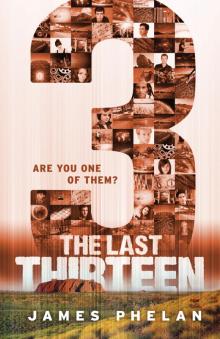 3
3 Survivor
Survivor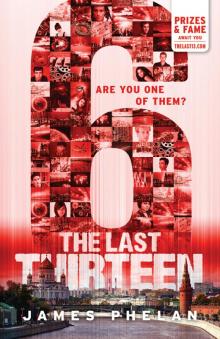 6
6 The Hunted
The Hunted Quarantine
Quarantine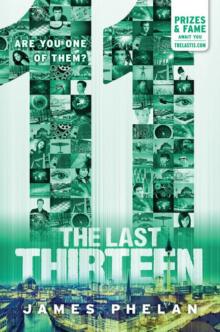 11
11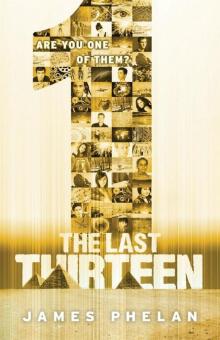 The Last Thirteen - 1
The Last Thirteen - 1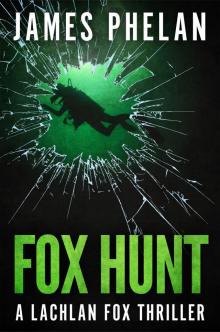 Fox Hunt
Fox Hunt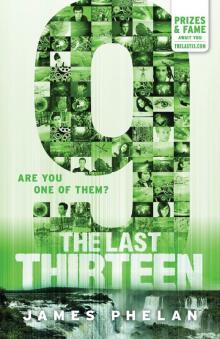 9
9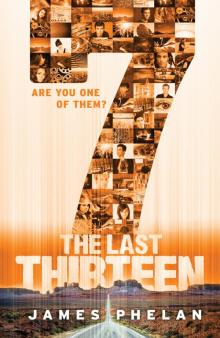 7
7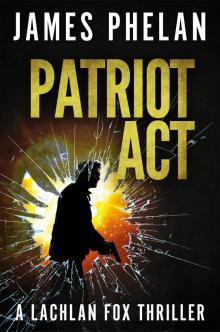 Patriot Act
Patriot Act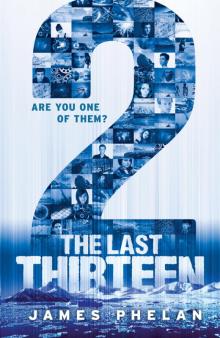 2
2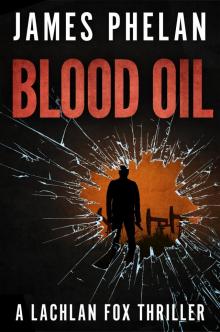 Blood Oil
Blood Oil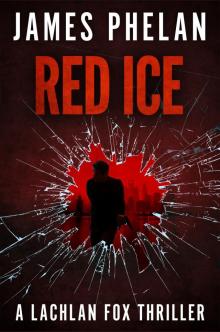 Red Ice
Red Ice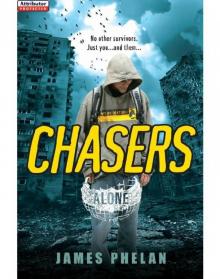 Chasers
Chasers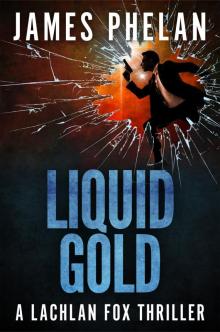 Liquid Gold
Liquid Gold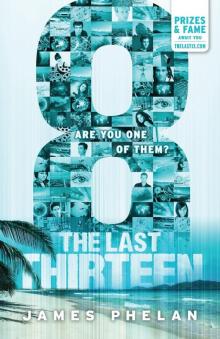 8
8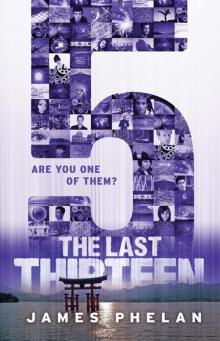 5
5 The Spy
The Spy Kill Switch
Kill Switch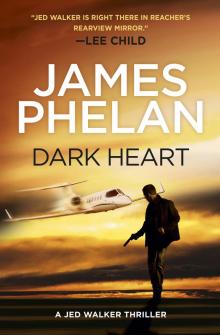 Dark Heart
Dark Heart